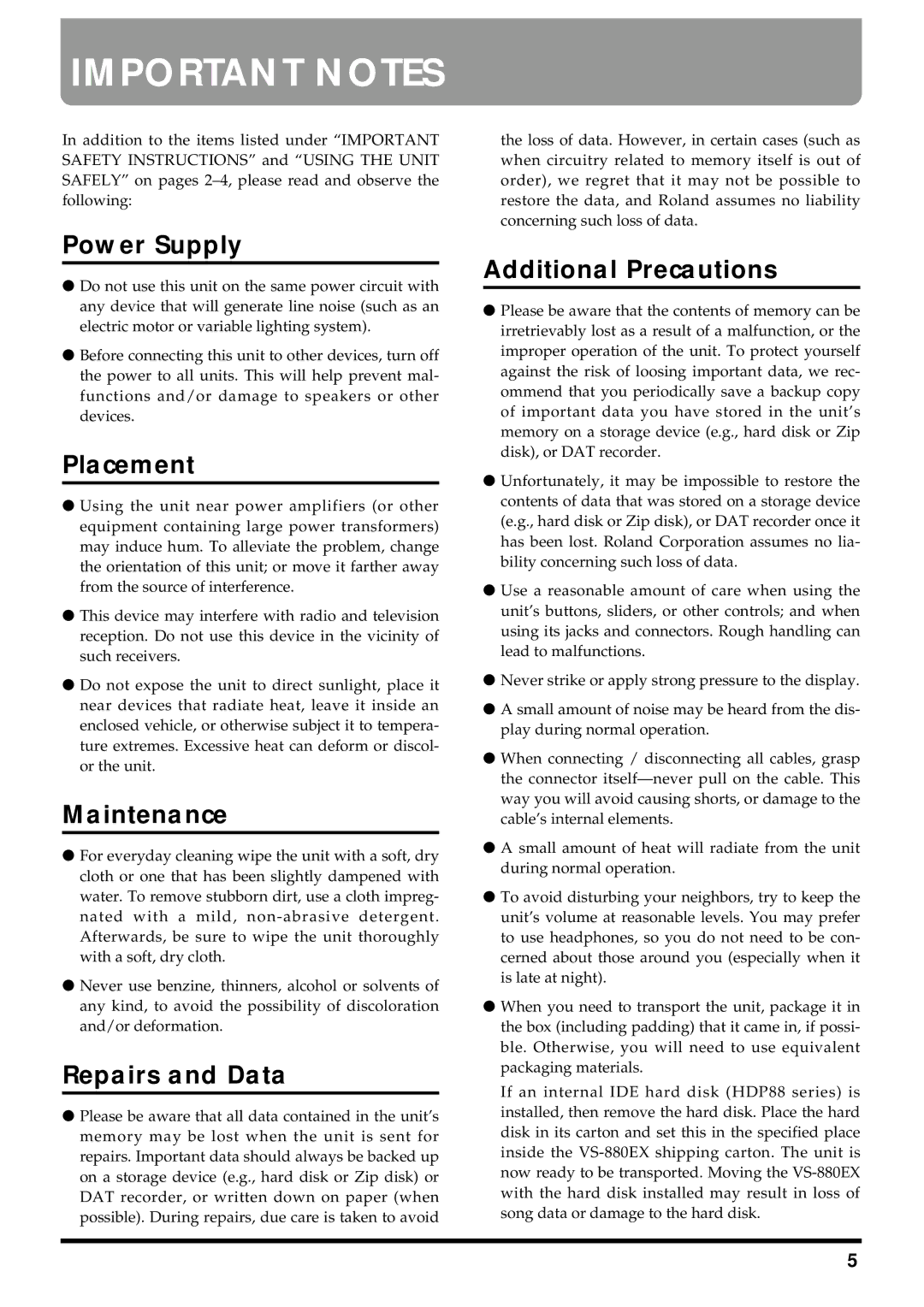
IMPORTANT NOTES
In addition to the items listed under “IMPORTANT SAFETY INSTRUCTIONS” and “USING THE UNIT SAFELY” on pages
Power Supply
●Do not use this unit on the same power circuit with any device that will generate line noise (such as an electric motor or variable lighting system).
●Before connecting this unit to other devices, turn off the power to all units. This will help prevent mal- functions and/or damage to speakers or other devices.
Placement
●Using the unit near power amplifiers (or other equipment containing large power transformers) may induce hum. To alleviate the problem, change the orientation of this unit; or move it farther away from the source of interference.
●This device may interfere with radio and television reception. Do not use this device in the vicinity of such receivers.
●Do not expose the unit to direct sunlight, place it near devices that radiate heat, leave it inside an enclosed vehicle, or otherwise subject it to tempera- ture extremes. Excessive heat can deform or discol- or the unit.
Maintenance
●For everyday cleaning wipe the unit with a soft, dry cloth or one that has been slightly dampened with water. To remove stubborn dirt, use a cloth impreg- nated with a mild,
●Never use benzine, thinners, alcohol or solvents of any kind, to avoid the possibility of discoloration and/or deformation.
Repairs and Data
●Please be aware that all data contained in the unit’s memory may be lost when the unit is sent for repairs. Important data should always be backed up on a storage device (e.g., hard disk or Zip disk) or DAT recorder, or written down on paper (when possible). During repairs, due care is taken to avoid
the loss of data. However, in certain cases (such as when circuitry related to memory itself is out of order), we regret that it may not be possible to restore the data, and Roland assumes no liability concerning such loss of data.
Additional Precautions
●Please be aware that the contents of memory can be irretrievably lost as a result of a malfunction, or the improper operation of the unit. To protect yourself against the risk of loosing important data, we rec- ommend that you periodically save a backup copy of important data you have stored in the unit’s memory on a storage device (e.g., hard disk or Zip disk), or DAT recorder.
●Unfortunately, it may be impossible to restore the contents of data that was stored on a storage device (e.g., hard disk or Zip disk), or DAT recorder once it has been lost. Roland Corporation assumes no lia- bility concerning such loss of data.
●Use a reasonable amount of care when using the unit’s buttons, sliders, or other controls; and when using its jacks and connectors. Rough handling can lead to malfunctions.
●Never strike or apply strong pressure to the display.
●A small amount of noise may be heard from the dis- play during normal operation.
●When connecting / disconnecting all cables, grasp the connector
●A small amount of heat will radiate from the unit during normal operation.
●To avoid disturbing your neighbors, try to keep the unit’s volume at reasonable levels. You may prefer to use headphones, so you do not need to be con- cerned about those around you (especially when it is late at night).
●When you need to transport the unit, package it in the box (including padding) that it came in, if possi- ble. Otherwise, you will need to use equivalent packaging materials.
If an internal IDE hard disk (HDP88 series) is installed, then remove the hard disk. Place the hard disk in its carton and set this in the specified place inside the
5
